I was fired because Cargill complained to my government employer about my LinkedIn posts
Free speech, Social Media and the Public Interest
On LinkedIn, I am an unpaid, self-anointed satirist and editorial cartoonist. My goal is to hold powerful people and institutions accountable. To give voice to those who choose to stay silent for fear of retaliation. LinkedIn should be place for public discourse by private individuals representing themselves as private citizens. We represent experts with unique and privileged insights that must be shared to publicly as foster collective civic action for the public good.
On November 20, 2024, I was discharged from my full-time job as Economic Policy Analyst at the state environmental regulator, Minnesota’s Pollution Control Agency (MPCA). Why? Because the world’s largest buyer and trader of agricultural commodities and largest private corporation in the U.S., Cargill, complained to my employer, MPCA, about my personal social media activity questioning Cargill’s (non-regulated) sustainability claims. Cargill’s view is that “posts on this website (LinkedIn) from government employees [are] as distinct from private citizens.” Do you agree? Or is this revelation chilling?
“Kind of a curious and unusual situation with Derric, your new economist.”
— Director, Environmental Analysis and Outcomes Division, Minnesota Pollution Control Agency, to their senior staff regarding Cargill’s complaint
Please see my MPCA dismissal letter below:
What policy did my employer said I violated?
MPCA says I violated their Social Media Policy because Cargill perceived that my personal speech on LinkedIn represented MPCA. MPCA Policy states, “do not use personal social media to speak on behalf of the agency, or to indicate you are representing the interests of the agency.” MPCA also suggested that I engaged “in behavior that would adversely affect their work, job duties or ability to function in their position, or create a hostile work environment.” Finally, MPCA said that Cargill’s complaints about my personal speech “disrupted,” MPCA’s work because staff had to address Cargill’s complaints.
Was I aware of the policy?
Yes.
According to my employer, when and how did I violate the policy?
Because on August 22, 2024, when Cargill complained about my private message conversation with another individual who works for Cargill and because on November 14, 2024 Cargill complained about my personal comments on Cargill’s public facing LinkedIn account. And because Cargill perceived my personal speech on LinkedIn represented MPCA.
Cargill claimed my personal views expressed via my private LinkedIn account were not personal or “my own” (although I state on my LinkedIn profile that “All my posts and comments are my own”) and instead Cargill views any government employees social media activity as representing the views of their employer; in my case, MPCA, who was at the time, listed on my profile under as my latest employer, which employees are allowed to disclose per MPCA’s Social Media Policy.
Had I been warned about violating the policy?
Yes. Although not given as a formal “warning,” I was given a “MEMO” on August 28, 2024, which I was told to view as “informational” and not as a “disciplinary action.” After the first Cargill complaint, I received the following language in a “MEMO,” stating:
“Recently, MPCA received a complaint regarding your personal LinkedIn account. On this social media site, you listed MPCA as your employer. By listing MPCA as your employer on a public social media site, you are notifying others that you are a public employee which gives the impression that you are speaking on MPCA’s behalf and/or are representing MPCA’s views. You are not authorized to represent MPCA’s views, and you must not engage in behavior that would adversely affect your work, job duties or ability to function in your position or create a hostile work environment. Even if it is not during work time or is on personal devices, if you engage in such behavior, personal social media use may become the basis for discipline. You should not post comments/posts/tweets/etc. that: 1) Impede the services provided by MPCA; 2) Disrupt MPCA’s workforce or operations; 3) Interfere with important working relationships; 4) Negatively impact the ability of MPCA to carry out its mission.”
Yet I did interpret this as a warning saying I should not make any future personal social media posts while having MPCA listed as my employer or by making any disclosure of my working at MPCA. And that doing so would result in my receiving a disciplinary action. Consequently, I immediately removed from any mentioning of my employment with MPCA from my LinkedIn profile on August 28, 2024 (even though MPCA’s Social Media Policy allows employees to list their MPCA employment on their personal LinkedIn profiles).
Furthermore, I was never told, even upon asking, what would be the nature of the “discipline.” Consequently, I was not warned that another future capricious complaint regarding my personal social media speech would result in my immediate non-certification or dismissal. I never not told to not engage with Cargill, any other corporation or individual, through my personal social media advocacy.
Indeed, on August 28, 2024, I asked Bill Cole via email “RE: Amended review and memo” for more clarity on exactly how I violated MPCA policies and what was the purpose of the “MEMO.” I asked for “an explanation as to what purpose this memo serves the State as employer and myself as employee? I stated that “I would prefer this not be attached to my official record because I am not convinced - at this time - that I did anything knowingly inappropriate based on my reading and understanding of MN Dept of Management and MPCA codes of conduct, including those on the use of social media.” I also said in my email to Bill, that I would discuss this matter with my MAPE Union representative. Finally, I requested the formal response by the Commissioner’s office to Cargill regarding this matter.
I did not receive any response beyond that I should interpret the “MEMO” as “informational.” And I was never provided an answer from management regarding my request to know the response of MPCA to Cargill regarding this first complaint. Indeed, I had to make a formal data request to HR about the latter. It took over five weeks and multiple email reminders by me to HR to learn in October that there were “no additional data” regarding MPCA’s response to Cargill.
My discussion with my MAPE Union representative on August 30, 2024, resulted in their informing me that because I was currently “uncertified” I did not qualify for full Union protections. But that if I had been the Union would support my filing of a grievance. My Union representative did not agree with MPCA management that my personal actions violated MPCA Social Media Policy. And if upheld, they said MPCA’s decision was “chilling” to other MPCA employees.
So what was my job at MPCA?
My job at MPCA was Economic Policy Analyst with the following job description: This position exists to perform economic analysis related to regulatory and policy environmental protection activities for water, air, land and renewable energy resources. It evaluates and quantifies benefits, costs, incentives and impacts of alternatives using economic principles and statistical techniques. It also evaluates ecosystem services associated with maintaining water resources for a variety of uses. This position performs independent research and reviews economic research activities, correlates complex technical findings and interprets economic theories and reports. It also performs and provides support for financial analysis of individual firms and municipalities for activities such as compliance ability to pay cases, natural resources damage assessments, water quality variances and antidegradation reviews. In addition to assisting agency staff with economic and financial analyses, this position conducts and provides assistance with statistical analyses. Indeed, I had only been on the job almost six months. Most of my efforts had been on learning about MPCA programs, process, and Minnesota Statutes and rules around the Clean Water Act.
But, you might ask, didn’t MPCA know about your social media advocacy prior to hiring you?
Yes. They did. I have long commented on Cargill’s own public LinkedIn posts well before taking this position at MPCA.
I had an email exchange with the hiring manager prior to agreeing to accept MPCA’s job offer. Specifically, I asked if “this position at MPCA afford me editorial latitude outside of the “office?”” I disclosed that I’m “also a practicing unpaid editorial essayist and cartoonist. Its been a way for me to engage both my right and left brain when communicating my science and to publicly critique the many private and public policy solutions being proposed to chart society and business on a more sustainable course.”
I was told by the hiring manager that “to [their] understanding, [they didn’t] see this as a problem. [They] would like to verify with [their] manager or HR just to be sure. [They] personally think it’s great that you are doing this and would want you to continue.” And that they “personally think it’s great that you are doing this and would want you to continue.” Concluding, they confirmed that they “checked with HR and also reviewed the conflict of interest form you already sent in and don’t see a problem. The bottom line is the there should be no conflict of interest with the business (i.e., financials) or mission (i.e. ensuring that every Minnesotan has healthy air, sustainable lands, clean water, and a better climate) of the agency.”
I interpreted this conversation to suggest that the hiring manager and MPCA was supportive of my public critique of private and public policy solutions. MPCA made no stipulations about who or what I could or could not advocate for or comment on. I accepted the position based on this understanding. Consequently, I kept right on posting my political editorials, cartoons, comments and engagement via my personal LinkedIn profile.
Indeed, MPCA never made a peep about my social media activity during my first three months at the Agency.
Were you bad at your job?
My three month performance review demonstrated that I could personally post on social media without “adversely affecting [my] work, job duties or ability to function in [my] position or creating a hostile work environment” (MPCA’s Social Media Policy) - see below. Moreover, my supervisor commented on my review that “Derric has met all employee expectations…He has clearly demonstrated the technical abilities to fulfill the position’s responsibilities, the ability to learn quickly and has established good working relationships…I appreciate Derric’s curiosity, willingness to ask the “hard questions” and his drive for improving the Agency’s work.” That last one, “willingness to as the “hard questions”” is ironic given that just a few days after my receiving this performance review I would be made aware of Cargill’s complaint to MPCA regarding my personal social media activity and their dislike of the questions I was asking.
So why did Cargill complain to MPCA about my personal social media advocacy on LinkedIn?
Cargill Complaint #1
On August 23, 2024, I received a work email from leadership alleging my social media ‘wrongdoing:’
“It has been brought to my attention that you have been communicating with a representative at Cargill over LinkedIn chat. Do not engage with the Cargill employee any further (original bolding). As a state agency employee, this is not an appropriate avenue to seek information from a private company that is regulated by our agency.”
Cargill’s first complaint was sent on August 22, 2023 to three MPCA staff including Kate Knuth (MPCA Climate Director), Tom Johnson (MPCA Government Relations Director), Frank Kohlasch (MPCA Assistant Commissioner) and Rachel Ganani (MPCA Chief of Staff). In their complaint, Cargill shared a screenshot of my private conversation with another LinkedIn user who happened to work at Cargill.
The private message conversation was about a recent post by the other user regarding their work on sustainable aviation fuels for Cargill. My reason for private messaging this person was because of my personal interest in the biofeedstock Cargill was publicly touting as being “sustainable.” I had done the economic analysis of this feedstock, winter camelina, while working at the University of Minnesota, prior to my working at MPCA. From my research I found that this crop wasn’t as environmentally or economically beneficial as was being publicized by the individual and Cargill.
Here is Cargill’s complaint email to MPCA:
From: Gary Kay <Gary_Kay@cargill.com>
Sent: Thursday, August 22, 2024 4:13 PM
To: Knuth, Kate (MPCA) <Kate.Knuth@state.mn.us>
Subject: Cargill intro, issue concern
Hello Kate,
Please allow me a quick introduction – my name is Gary Kay and I am part of Cargill’s state government relations team. I’m based here in Minnesota at our HQ and serve as the liaison between Cargill and MN policymakers and agency stakeholders.
I’m sorry to have to make an introductory contact to you on an issue that has come to me attention from a colleague of mine who helps lead our work in the novel winter oilseed space. Anna Teeter received a connection request on LinkedIn and engaged in an unsolicited conversation with an employee at the MPCA who I believe reports to you. I’ve attached the conversation below for your review.
Our concerns lie with the accusations of green washing, and just the unprofessional nature of Mr. Pennington’s tone. Asking for future planned investments, market insights, and what we are paying producers are, in our opinion, wildly outside the scope of a state regulator. I should also note that Mr. Pennington identified himself as an MPCA employee, and linkedin is considered a professional network and conversations should be considered as such.
Cargill has always considered itself a collaborator and resource with state agencies such as MPCA and have participated on panels with the agency in the past, and we hope to be considered as a resource in the future. My hope is that conversations between Cargill and MPCA remain professional in nature, and unsubstantiated labels and insinuations be left on the sidelines.
I am happy to talk about this further if you would like. My cell is below, and I appreciate your time and consideration.
Best regards,
Gary Kay
--
Gary Kay
Director, Government Relations Law
Cargill
Direct: 952-984-0571
Cell: 763-300-5987
15407 McGinty Rd W | MS 50 | Wayzata, MN 55391 www.cargill.com”
Here is the LinkedIn Private Message between myself and another individual via our private LinkedIn accounts. This private conversation was shared, unknowingly to me, by Cargill (the other individual’s employer) to my employer, MPCA:
Cargill, in their first complaint to MPCA, said they thought my private conversation with the individual, who was employed by Cargill, was “inappropriate.” Why? Because I asked the direct questions about Cargill’s private commercial decision-making relating to its purchasing of bio-feedstocks for aviation fuels, specifically winter camelina, which the individual provided answers such as the price Cargill was paying farmers. And, that I “insinuated” Cargill’s efforts might be “greenwashing.” I’ve posted on LinkedIn about the challenges of adopting winter camelina as a sustainable biofuel feedstock and Cargill’s promotion of this feedstock.
I was bewildered to learn Cargill had shared a LinkedIn private message between myself and another individual via their personal profile. This individual was employed Cargill. Either Cargill monitors their employee’s social media or this individual decided to share my post with their employer. I was chilled to see what I thought was a private conversation shared back to me by MPCA. Was Cargill’s intent to threaten my employment? I have often publicly questioned Cargill’s sustainability claims over the past couple years prior to my being hired by MPCA - was this a retaliatory action by Cargill?
It was not my intent for my personal speech on Linkedin to represent MPCA; however, how could I control what someone else might perceive? My employment at MPCA is public information that can be freely searched and accessed online. I shared Cargill’s complaint with the Union’s Steward, also an MPCA employee. Their response was, “Its chilling.” How other than self-censoring, could a government employee avoid their personal public opinions being misconstrued to representing that of their employer? Interestingly, MPCA referred to LinkedIn’s private messaging as “LinkedIn chat,” which to me downplayed the “privacy” aspect of my shared conversation by Cargill. Indeed, it is LinkedIn policy to never share a user’s private messages with the user’s employer.
In my email response to MPCA management’s email asking me to cease speaking to the Cargill employee over Linkedin private messaging I raised the following questions: “Regarding the "Code of Ethical Conduct" I am curious how this statement "NOTE: Nothing in this policy shall be construed to suggest that an employee should not participate in a matter because of their political, religious, or moral views" comes into play in these sorts of matters? Can an employee only publicly speech on topics unrelated to their employment at PCA? Where is the line drawn? And what exactly is the “risk” to the state per my questioning of Cargill? Also, can you share the formal complaint made by Cargill to the Commissioner's office with me, especially if it specifically refers to me by name?”
I received no answers from MPCA management or HR regarding these questions. Even after I was dismissed HR would not confirm whether they considered my first amendment rights when assessing Cargill’s complaint and my compliance with MPCA Social Media Policy. Through a post-dismissal information request, I learned that my questions to managment about the policy were shared with HR. I also learned that management was happy to also ignore my questions and my email entirely - which is what they ultimately did. I never received an answer to my clarifying question nor did I ever learn what was MPCA’s response was to Cargill’s formal complaint. My impression was that all formal complaints were public information and assumed responses to these complaints would also be made public. I was eventually told two months after asking to see MPCA’s response to Cargill that there was no written or audio record of MPCA’s response to Cargill. Only after my departure and through a data request did I learn that conversations between MPCA Commissioner’s Office and Cargill had occurred.
What I did receive from management and HR after learning about the Cargill complaint was a “MEMO.” I was told by my supervisor that this MEMO wasn’t a “disciplinary action but informational.” See the MEMO below.
The MEMO. Emphasis, i.e., bolding, provided by Derric.
DEPARTMENT: POLLUTION CONTROL AGENCY SF-00006-05 (4/86)
STATE OF MINNESOTA
DATE: August 28, 2024 Office Memorandum
SUBJECT: Social media complaint
Recently, MPCA received a complaint regarding your personal LinkedIn account. On this social media site, you listed MPCA as your employer. By listing MPCA as your employer on a public social media site, you are notifying others that you are a public employee which gives the impression that you are speaking on MPCA’s behalf and/or are representing MPCA’s views. You are not authorized to represent MPCA’s views, and you must not engage in behavior that would adversely affect your work, job duties or ability to function in your position or create a hostile work environment. Even if it is not during work time or is on personal devices, if you engage in such behavior, personal social media use may become the basis for discipline. You should not post comments/posts/tweets/etc. that: 1) Impede the services provided by MPCA; 2) Disrupt MPCA’s workforce or operations; 3) Interfere with important working relationships; 4) Negatively impact the ability of MPCA to carry out its mission.
Please feel free to contact me if you have questions about the content of this memo.
Cc: Paul Pestano, HR File
My interpretation of this “information” was that going forward I should remove any mentioning of MPCA on my LinkedIn profile and to never mention to anyone that I was employed by MPCA. Interestingly and confusingly, MPCA’s Social Media Policy allows employees to list their MPCA employment on their LinkedIn profile. Nevertheless, I was happy to comply with HR’s new criteria. From August 28th and onward, my Linkedin would not list MPCA was my employer. I already had stated on my profile the “my ideas and comments represented my own views and not that of my employer.” Of note, MPCA did not inform me to never post on social media in the future or stipulated who or who I couldn’t engage with. Specifically, MPCA has never in its policies stated that employees are not allowed to publicly comment about entities MPCA regulates. Also worth noting, Cargill is regulated by MPCA, as is anyone living or doing business inside Minnesota; however, the content in question per Cargill’s complaints was not related to anything MPCA regulates or my job duties.
Fascinatingly, I also learned after being dismissed via my data request to HR that Cargill’s Government Relations Director asked the Executive Director of AgriGrowth.org, an industry lobbying NGO and a Political Action Committee called MN AgPAC (Cargill sets on the Board and is a paying member), to see if they “could put [their] MPCA hat back on for a minute and give [their] thoughts on how [Cargill] might handle this (meaning me, Derric) - “the green washing accusation certainly struck a nerve.” Consequently, AgriGrowth’s Executive Director, Darin Broton, also the former Strategic Communications Director for MPCA’s Commissioner Office, sent a forwarding email with Cargill’s concerns to MPCA’s Government Relations Director at Minnesota Pollution Control Agency with the subject line, “Can you call me when you’re free?” AgriGrowth.org via its PAC has donated multiple times to the current MN Governor and members of the state legislature.
Cargill Complaint #2
The second complaint by Cargill to MPCA regarding my personal LinkedIn advocacy wasn’t revealed to me until after I was discharged. At the time, I was only told there had been “a second complaint received by the MPCA Commissioner's Office by a regulated business regarding a message [I] posted through [my] LinkedIn account to their company's public facing LinkedIn account.” See dismissal letter at the top of post. Only through a data request to Human Resources did I learned that this second complaint was also made by Cargill. I had publicly questioned statements made by Cargill via its own LinkedIn account.
Below is Cargill’s email to MPCA that followed Cargill leaving a voicemail on the cell phone of MPCA Commissioner's Chief of Staff:
From: Gary Kay <Gary_Kay@cargill.com>
Sent: Thursday, November 14, 2024 3:34 PM
To: Ganani, Rachel (MPCA) <Rachel.Ganani@state.mn.us> (Chief of Staff to the Commissioner of MPCA)
Subject: RE: introduction
Do not select links or open attachments unless verified. Report all suspicious emails to Minnesota IT Services Security Operations Center.
Hi Rachel,
I hope you are well. It was great to meet you in-person at the airport a few months ago. I wanted to provide a quick update on the social media behavior of Mr. Pennington.
Cargill recently announced and promoted the enrollment of more than 1M acres in our climate smart ag program which encourages and pays producers for the adoption of on- field practices such as no-till and cover crops, among others.
We received a response on LinkedIn again from Mr. Pennington, which I am sharing below –
— [Derric’s “inappropriate” comment via his personal LinkedIn account see Cargill's post] : “Cargill what % does this 1 M acres represent relative to your total U.S. farm acres? Iowa alone had over 28 million acres planted in corn and soy last year. And...Your RegenConnect program pays $20 per MT of C sequestered. Based on optimistic estimates for annual C sequestered in row crop ag with cover crops, farmers would only receive about $10-12 per acre and much less for no till. The average per acre costs for cover crops is ~$60 per acre. So who is paying the roughly $50 per acre difference? The farmer? U.S. taxpayers? Cargill Catagory Managers? Who? Also what happens [when] the payments go away?” —
As I mentioned the first time, we view posts on this website from government employees as distinct from private citizens. Additionally, we take issue with the tone and the facts he put forward.
I appreciate your attention to the matter. Our team has done exceptional work in this space and we certainly hope MPCA feels the same.
Best, Gary”
Cargill’s public post was about the success of their carbon market program, RegenConnect. I asked science-informed questions about what the total amount of carbon sequestered and what proportion of the farmer’s costs did Cargill provide? Of note, I’ve critically posted about this Cargill program in the past.
Cargill complains here that they didn’t like my “tone or [my] facts.” Tone of an email or a post or comment can be interpreted in various ways. But the “facts?” That’s something Cargill could debate. They could counter and offer their own facts to refute my facts. But they didn't do so. Neither in this email to MPCA or by replying directly to my comment on their Linkedin post. I wouldn’t even known they took issue with my comment if not for reading this email to MPCA’s Commissioner’s office. Again, it’s worth noting that MPCA does not regulate GHG emissions from Cargill or agriculture in general nor does it regulate carbon markets. Cargill is complaining about my commenting on a matter MPCA does not regulate.
Finally, what I think is most salient to any government employee who uses social media is Cargill’s view that “posts on this website (LinkedIn) from government employees [are] as distinct from private citizens.” Chilling. So if Cargill can prove you are a government employee and they will interpret your speech as representing the government. Is this fair? How can a government employee avoid being publicly outed as a government employee? It’s public information. What this does is lead to government employees self-censoring their free speech in terms of publicly expressing their political, religious and moral thoughts and values. It self-censors them from being public advocates of issues they care about, to advocate.
Summing up
In my view I did not violate MPCA policy. My speech on LinkedIn is protected speech under the First Amendment and reflects my personal political and moral views, including on Cargill’s public comments and advocation of its sustainability policies and activities.
Indeed, MPCA’s own Code of Ethics Policy states, in bold, that “Nothing in this policy shall be construed to suggest that an employee should not participate in a matter because of their political, religious, or moral views.” Furthermore, MPCA’s Social Media Policy also states that “nothing in this policy shall prohibit or infringe on speech or expression that is protected by law.”
MPCA evaluates employee compliance with these policies on a case-by-case basis. Part of this process includes having MPCA’s Offices of Human Resources meet with MPCA’s Legal Services to discuss “what statutes, regulations, and case law are needed to interpret the policy, including questions involving the First Amendment, and determine if the policy has been violated [by an employee].” However, in my case, MPCA could not provide me with any documentation of communications between Human Resources and Legal Services to discuss my First Amendment rights in relation to my complying with the Social Media Policy.
My post-dismissal reading of MPCA’s management’s communications does suggest that at least one person acknowledged and raised early on my right to personal speech. Specifically, the Assistant Commissioner for Air and Climate Policy at MPCA wrote to management that “Derric can share his opinions as a private citizen [my emphasis]. Using LinkedIn is perilous in this situation because his employment status is clearly available [Note: MPCA’s Social Media Policy explicitly allows employees to list MPCA as an employment experience on personal social media]. He should also be clear that he is speaking on his personal opinions and experiences and not reference his role at the MPCA.” Their comments illustrate the thin-legal-line MPCA is trying to walk here. The intent of MPCA’s policy is to minimize any reputational or legal risk to the agency, or more likely, to the current elected administration, that could be caused by an employee’s personal public advocacy, intentionally or unintentionally.
I guess I presented a ‘Unicorn situation’ to management in that I had a well-established social media presence advocating my political and moral views well before being hired by MPCA. I disclosed this fact prior to my accepting the position with the supervisor who replied saying they’d “hope I would continue to post” and HR did not see a problem with my doing so.


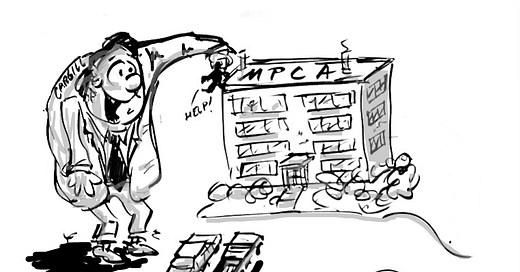



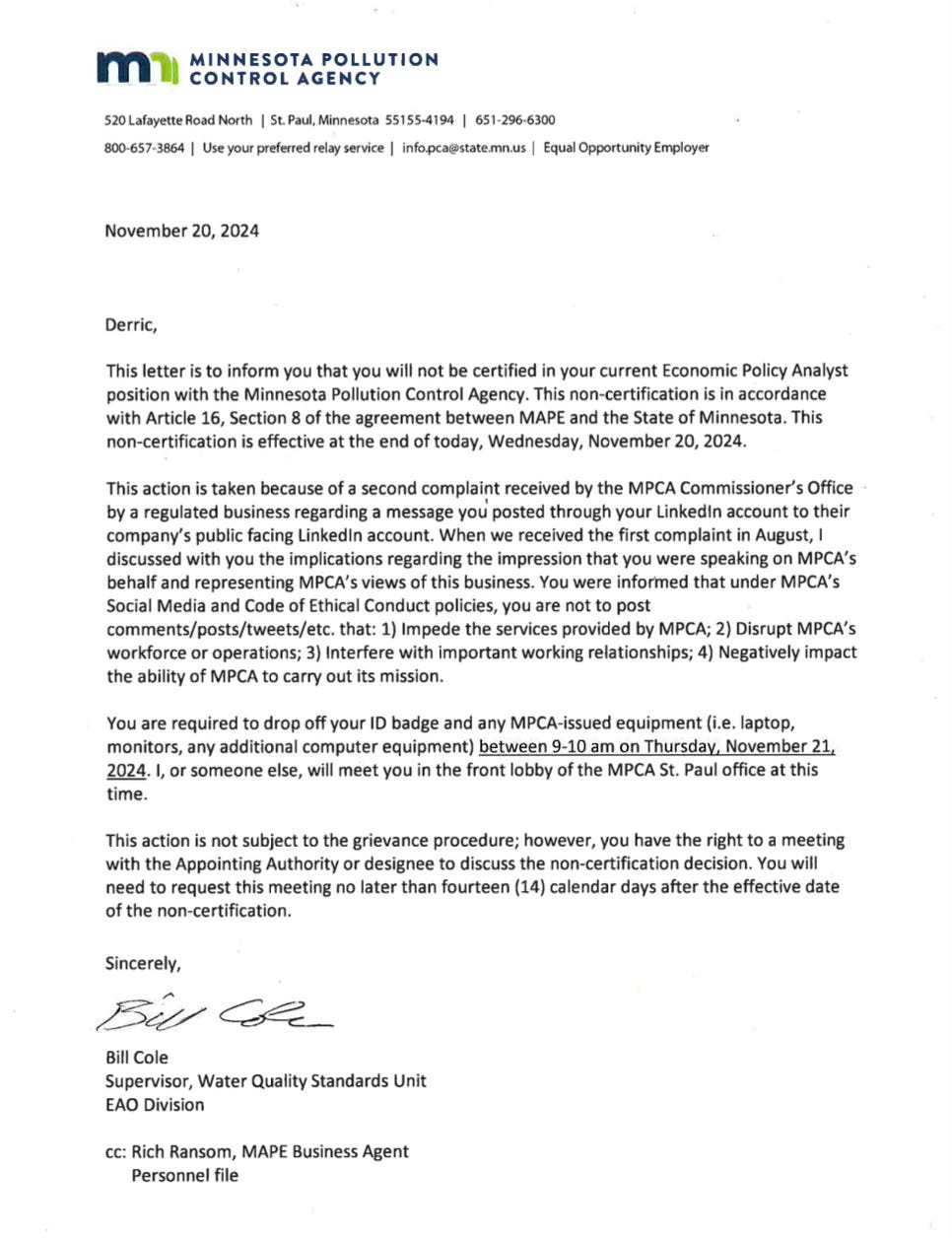
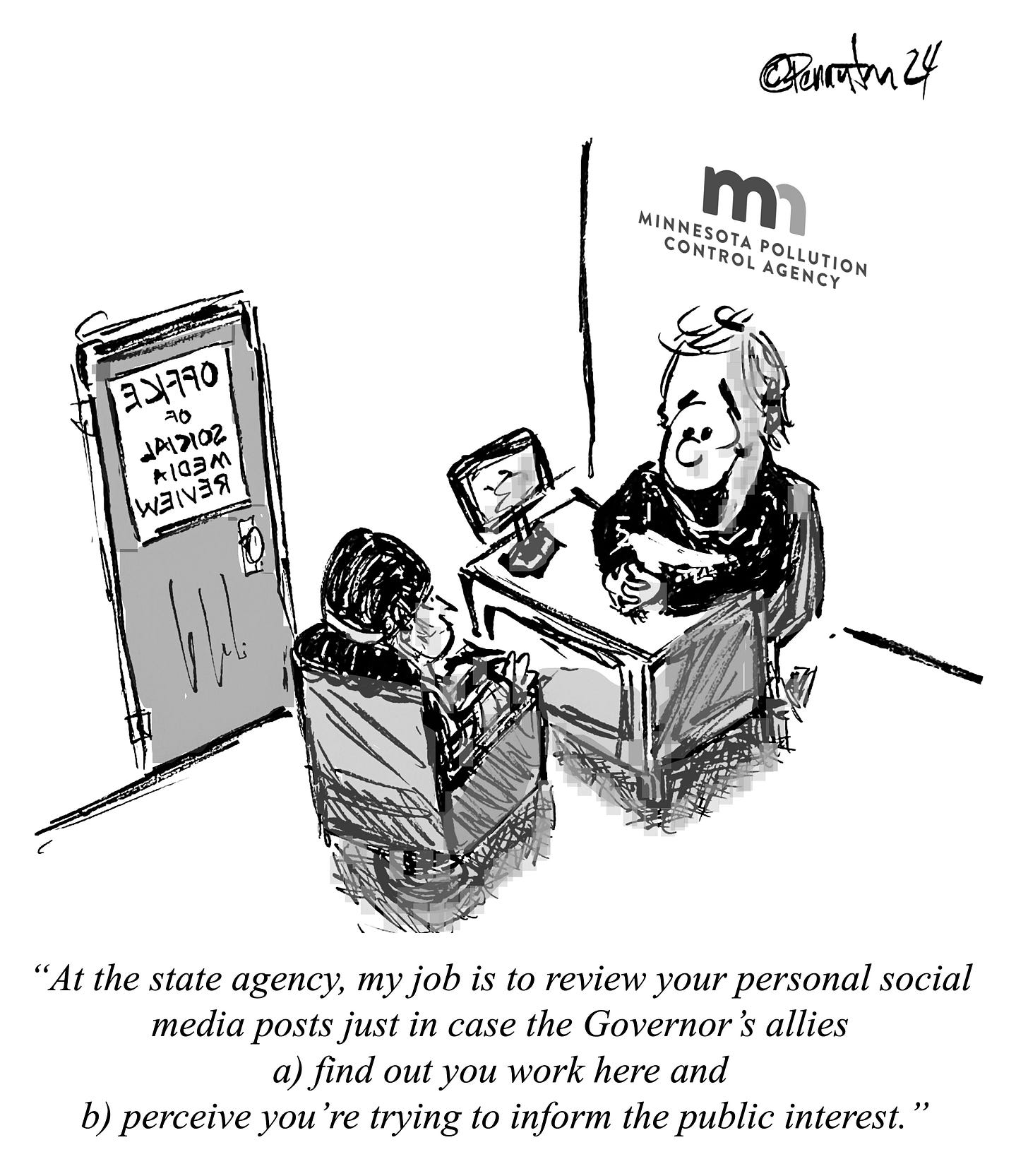
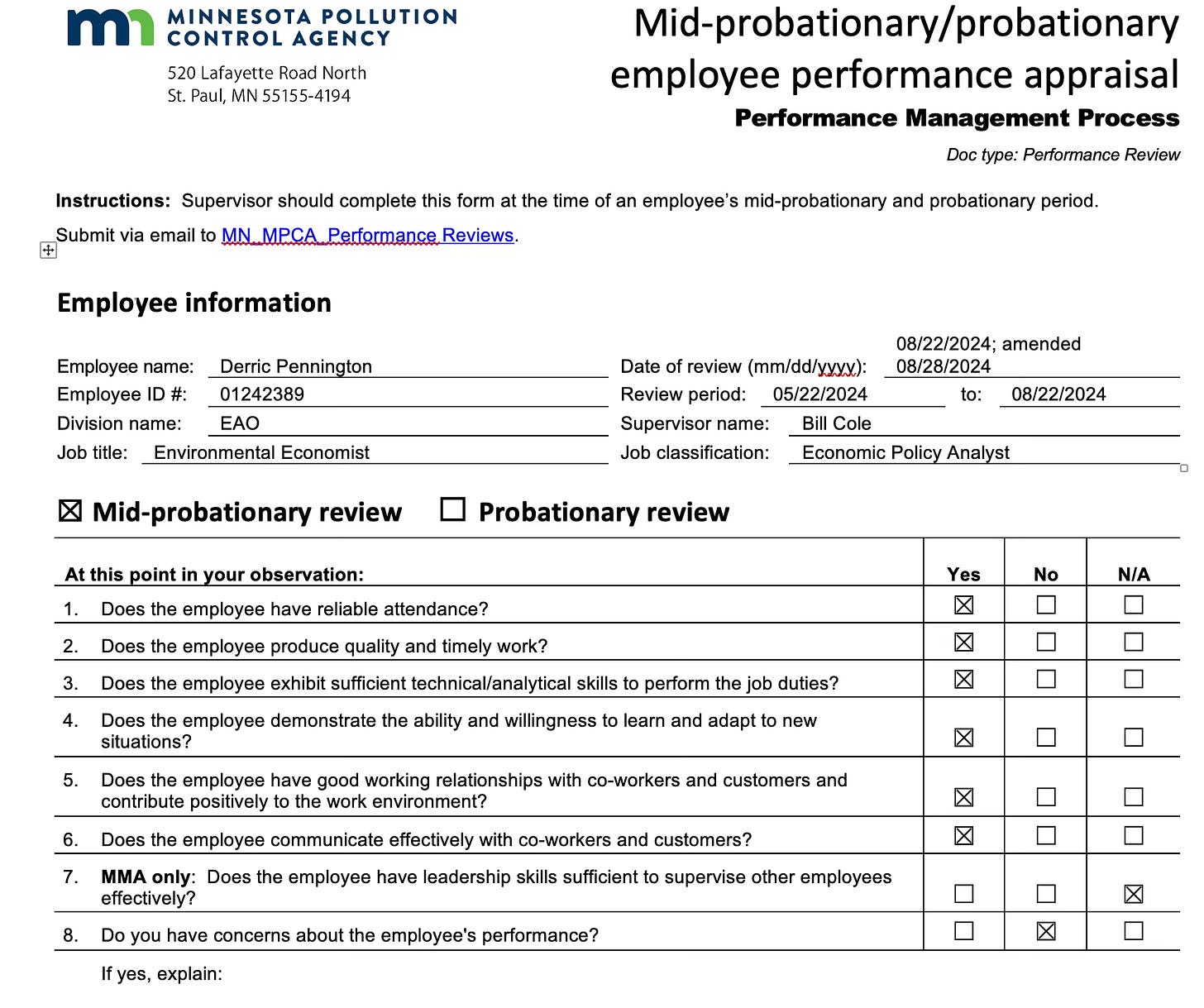
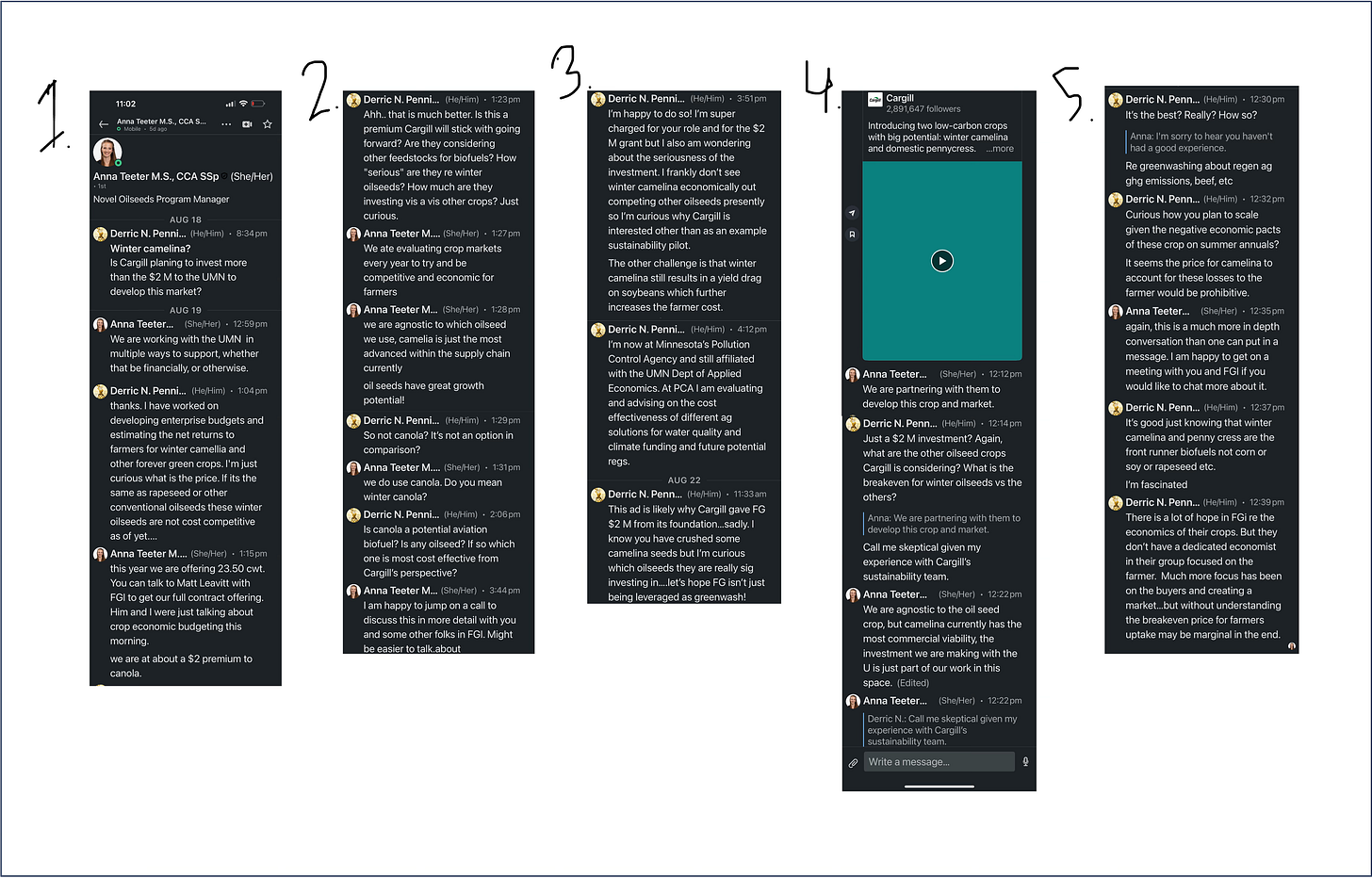
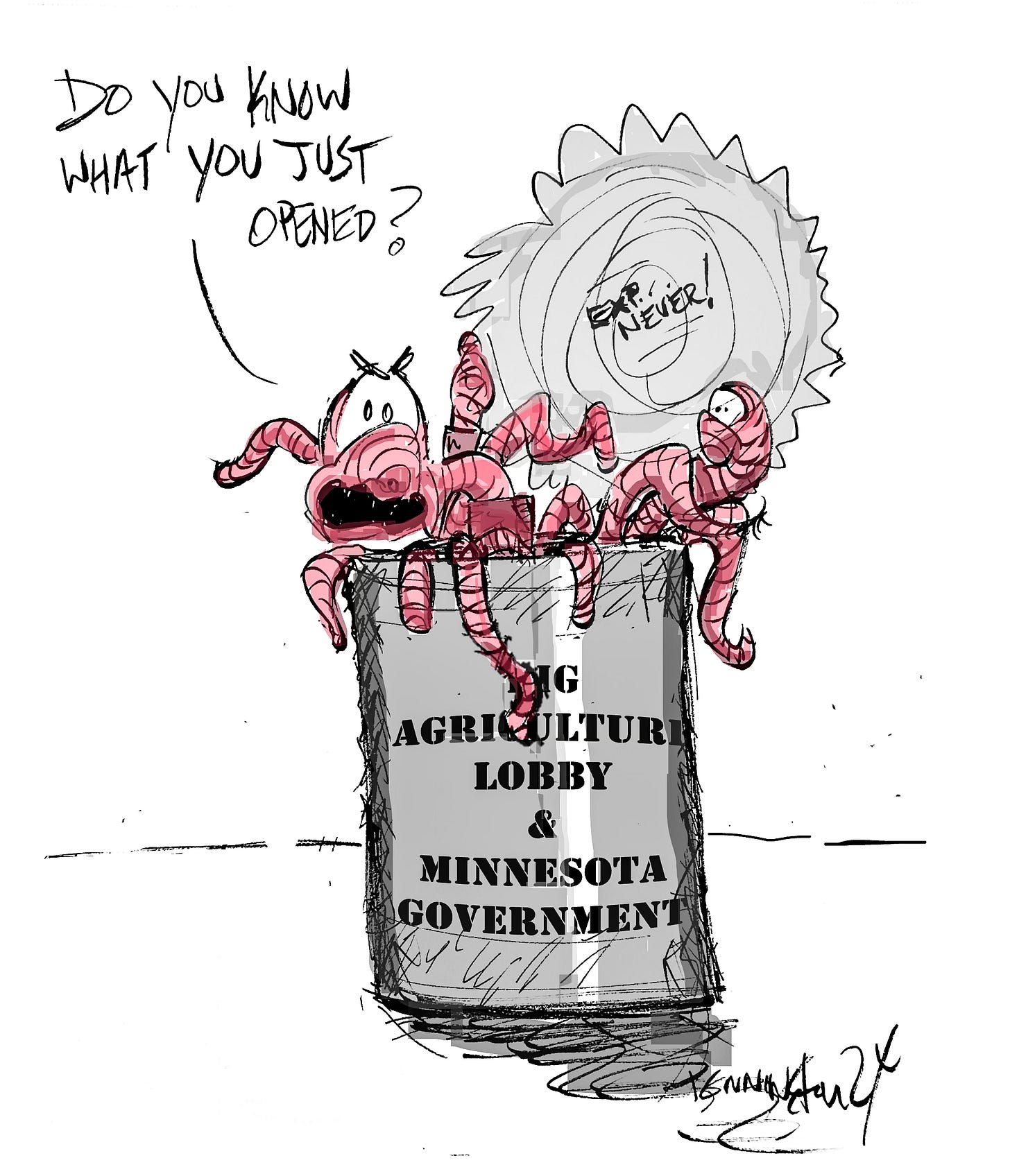
As a former MPCA employee who filed a whistleblower lawsuit I feel your pain. So do many of my friends who worked there. The rule of law does not apply to them, and the worst part is they know it. My situation involved illegal retaliation for stating to my superiors the MPCA was intentionally ignoring contaminated groundwater that people were (and still are) drinking. What me and my attorney discovered is there is no person/agency/elected official responsible for ensuring they follow the law. The chief ethics officer for MN stated they couldn't do anything, even for a known public health hazard. Your experience working there also proves that. Perhaps most concerning was the Attorney Generals Office defended the MPCA despite indisputable violations of the law! So the AG not only ignored but they endorsed the MPCA's behavior so it's no surprise it happened to you.
Derric, I'm so sorry this happened to you and this sounds like a really upsetting situation. I hope you are considering further action, because this seems like a pretty egregious violation of your rights as a citizen.